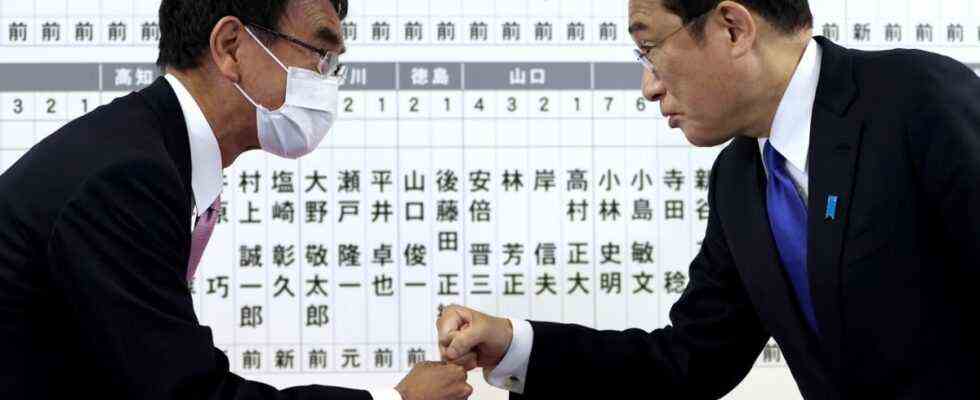It was almost midnight on election Sunday in Japan when the right-wing conservative ruling party LDP could be certain of its victory. In the chart of the broadcaster NHK, the red bar, which stood for the seats of the ruling coalition of LDP and Komei party, finally exceeded the mark of 233 seats for the simple majority in the lower house. The projections after the first polls at the polling stations were thus confirmed: no change of power. In the island state, the political establishment can see itself confirmed.
It was not a close victory, the red bar grew so steadily that Fumio Kishida, LDP president and Japan’s prime minister, could say earlier that evening: “We have won the public’s mandate.” But it wasn’t a victory without losses either. The LDP had 276 seats so far in the lower house, the Buddhist Komei party 29, so together they came to 305. According to the preliminary final result, the LDP only achieved 259 seats this time, Komei recorded a profit of 32 seats. What does this mean for the political orientation of the LDP? “We have to think twice about that,” said Fumio Kishida.
As the big election winner, Fumio Kishida, 64, couldn’t be celebrated on the night from Sunday to Monday. He has only been in office since the beginning of October. His predecessor Yoshihide Suga did not run for the regular LDP presidential election at the end of September after the polls were bad, mainly because of Suga’s mediocre coronavirus policy. Kishida prevailed in the internal power struggle, named a new cabinet and had to pass the greatest possible test in the general election. The lower house is the more powerful of the two parliaments in the Japanese bicameral system.
Kishida’s hope for optimism: in vain
Kishida got the support he needs to avoid being kicked out of office after a few weeks. But the seat losses also show that Kishida had hoped in vain that he and his new government team could spark something like a spirit of optimism. The losses will probably even affect the LDP leadership: NHK announced that night that General Secretary Akira Amari, 72, would offer his resignation. Kishida had only just put him in the post. But Amari lost the direct mandate in his Kanagawa 13 constituency. This has never happened to an LDP general secretary.
The mixed election results of the rulers are no surprise. Fumio Kishida is not a particularly colorful person himself, but a proven LDP force with experience in government policy as foreign minister and in party politics as head of the LDP council for policy research. He is not considered an arch-conservative hardliner, but he owes his election to the top of the LDP above all to the influence of the right-wing populist, long-time prime minister Shinzo Abe, who has been shrouded in scandal. You can see that in Kishida’s cabinet, in which many Abe friends sit, as well as two 77-year-old ministerial debutants and only three women. The ailing new LDP general secretary Amari is also close to Abe.
Voters could hardly get the impression that Kishida was bringing a breath of fresh air into the country. And his announcement to establish a “new capitalism”, a more equitable distribution of wealth, a departure from the neoliberal Abenomics policy of Shinzo Abe, he could not really hold out in the election campaign.
“Without growth there is nothing to distribute,” Kishida shouted the day before the election. His government plans to launch a new pandemic aid package worth several trillion yen to the economy. In doing so, it will continue to drive up the enormous national debt and rely on the ultra-loose monetary policy of the Japanese National Bank. So nothing new for the time being. A lot of people call this stability. Others do not find this muddling on inspiring. The result could be read from the election results.
The biggest winner in the opposition is a party with far-right positions
This time the center-left opposition had put up various joint candidates, which made them stronger in individual constituencies than before. For the Constitutional Democratic Party (CDP), the largest opposition party in Japan, CDP deputy chairman Akira Nagatsuma said the cooperation had “paid off”: “We have succeeded in becoming a reservoir for criticism of the government.” However, this is not necessarily expressed in numbers. The CDP, which had 110 seats so far, reached the 96th Japanese Communist Party (JCP), the CDP’s largest partner, losing two seats to ten.
The greatest success was a completely different opposition party, with which the CDP and JCP would probably never work together: Nippon Ishin no Kai, the party for the renewal of Japan, comes from Osaka and emerged from a successful local party. Ishin is for the decentralization of Japan. Otherwise she shares many right-wing positions with the LDP. Like them, Ishin is, for example, in favor of changing the pacifist constitution so that the former war aggressor Japan can be more defensive again. Ishin won 41 seats – so far the party had eleven. So even in Japan’s right-wing mainstream there are people who no longer want the LDP.
It was also noticeable that voter turnout was again low. According to the newspaper Asahi slightly higher than in 2017 (53.68 percent). But 55.33 percent isn’t a good result for such an important choice. Actually, neither party had reason to celebrate. This Sunday showed too clearly that there is great disenchantment with politics in Japan.

